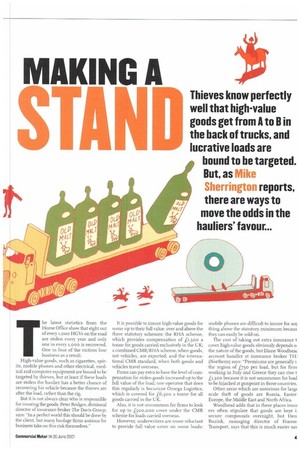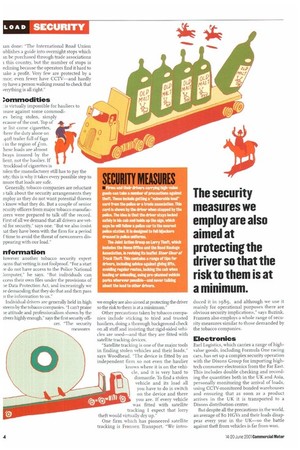MAKING A 4 3 1
Page 43

Page 44

If you've noticed an error in this article please click here to report it so we can fix it.
STA
Thieves know perfectly well that high-value goods get from A to B in the back of trucks, and lucrative loads are bound to be targeted.
But, as Milo
Sherrington reports,
there are ways to move the odds in the hauliers' favour...
The latest statistics from the Home Office show that eight out of every 1,000 HGVs on the road are stolen every year and only one in every i,000 is recovered. One in four of the victims lose business as a result. High-value goods, such as cigarettes, spirits, mobile phones and other electrical, medical and computer equipment are bound to be targeted by thieves, but at least if these loads are stolen the haulier has a better chance of recovering his vehicle because the thieves are after the load, rather than the rig.
But it is not always clear who is responsible for insuring the goods. Peter Bridges, divisional director of insurance broker The Davis Group, says: "In a perfect world this should be done by the client, but many haulage firms anxious for business take on this risk themselves." It is possible to insure high-value goods for sums up to their full value, over and above the three statutory schemes: the RHA scheme, which provides compensation of fr,300 a tonne for goods carried exclusively in the UK; a combined CMR/RHA scheme, when goods, not vehicles, are exported; and the international CMR standard, when both goods and vehicles travel overseas.
Firms can pay extra to have the level of compensation for stolen goods increased up to the full value of the load; one operator that does this regularly is Securicor Omega Logistics, which is covered for £6,500 a tonne for all goods carried in the UK.
Also, it is not uncommon for firms to look for up to f500,000 cover under the CMR scheme for loads carried overseas.
However, underwriters are more reluctant to provide full value cover on some loads: mobile phones are difficult to insure for an thing above the statutory minimum becaus they can easily be sold on.
The cost of taking out extra insurance t cover high-value goods obviously depends o the nature of the goods, but Diane Woodheac account handler at insurance broker THI (Northern) says: "Premiums are generally i the region of 1750 per load, but for firm working in Italy and Greece they can rise t £1,300 because it is not uncommon for load to be hijacked at gunpoint in those countries.
Other areas which are notorious for large scale theft of goods are Russia, Easter Europe, the Middle East and North Africa.
Woodhead adds that in these places insui ers often stipulate that goods are kept i: secure compounds overnight, but Hen Buzink, managing director of Fransel Transport, says that this is much easier sai tan done: "The International Road Union ublishes a guide into overnight stops which in be purchased through trade associations this country, but the number of stops is eclining because the operators find it hard to iake a profit. Very few are protected by a !rice: even fewer have CCTV—and hardly ay have a person walking round to check that verything is all right."
:ommodfties
: is virtually impossible for hauliers to isure against some commodies being stolen, simply ecause of the cost. Top of ie list come cigarettes, 'here the duty alone on 4011 trailer full of fags ; in the region ofTm 'hese loads are almost [ways insured by the Rent, not the haulier. If truckload of cigarettes is tolen the manufacturer still has to pay the uty; this is why it takes every possible step to nsure that loads are safe.
Generally, tobacco companies are reluctant ) talk about the security arrangements they mploy as they do not want potential thieves ) know what they do. But a couple of senior ecurity officers from major tobacco manufacirers were prepared to talk off the record. First of all we demand that all drivers are veted for security," says one. 'But we also insist tat they have been with the firm for a period f time to avoid the threat of newcomers disppearing with our load."
nformation
lowever another tobacco security expert rarns that vetting is not foolproof. For a start re do not have access to the Police National :omputer," he says. " But individuals can ccess their own files under the provisions of le Data Protection Act, and increasingly we re demanding that they do that and then pass n the information to us."
Individual drivers are generally held in high steem by the tobacco companies. "I can't praise ie attitude and professionalism shown by the rivers highly enough," says the first security officer. "The security measures we employ are also aimed at protecting the driver so the risk to them is at a minimum."
Other precautions taken by tobacco companies include sticking to tried and trusted hauliers, doing a thorough background check on all staff and insisting that rigid-sided vehicles are used—and that they are fitted with satellite tracking devices.
"Satellite tracking is one of the major tools in finding stolen vehicles and their loads," says Woodhead. "The device is fitted by an independent firm so not even the haulier knows where it is on the vehicle, and it is very hard to dismantle. To find a stolen vehicle and its load all you have to do is switch on the device and there you are. If every vehicle was fitted with satellite tracking I expect that lorry theft would virtually dry up."
One firm which has pioneered satellite tracking is Fransen Transport. "We intro duced it in 1989, and although we use it mainly for operational purposes there are obvious security implications,' says Buzink. Fransen also employs a whole range of security measures similar to those demanded by the tobacco companies.
Electronics
Exel Logistics, which carries a range of highvalue goods, including Formula One racing cars, has set up a complex security operation with the Dixons Group for importing hightech consumer electronics from the Far East. This includes double checking and recording the quantities both in the UK and Asia, personally monitoring the arrival of loads, using CCTV-monitored bonded warehouses arid ensuring that as soon as a product arrives in the UK it is transported to a Dixons distribution centre.
But despite all the precautions in the world, an average of So HGVs and their loads disappear every year in the UK—so the battle against theft from vehicles is far from won.
































































































